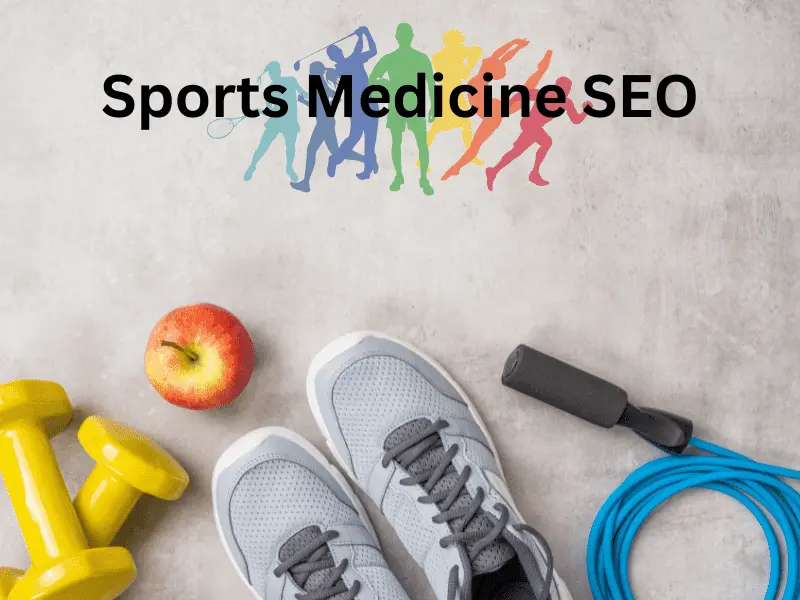In the competitive arena of healthcare, standing out in sports medicine requires not just exceptional patient care but also strategic digital marketing. Sports medicine SEO is your playbook for gaining visibility, attracting patients, and becoming the go-to authority in your field. But what makes SEO for sports medicine so unique?
Key Takeaways
- Understanding and implementing SEO strategies specific to sports medicine can significantly increase your practice’s online visibility.
- Local SEO, including Google My Business optimization, is crucial for practices with physical locations to attract local patients.
- Engaging, high-quality content not only boosts your SEO but also establishes your practice as a leader in the sports medicine field.
Understanding Sports Medicine SEO
SEO, or search engine optimization, is the art and science of making your website more visible to search engines. For sports medicine practices, this means tailoring your strategies to target patients searching for sports-related injury treatments and preventive care. Keyword research is the cornerstone of any successful SEO campaign, guiding you to the phrases and terms your potential patients are searching for online.
The Benefits of SEO for Sports Medicine Practices
Increased online visibility leads directly to more potential patients discovering your services. Moreover, a well-optimized website offers a better user experience, keeping visitors engaged and reducing bounce rates. Trust in your practice grows as patients find helpful, relevant information easily, cementing your reputation in the digital and real world.

Essential Components of Sports Medicine SEO Strategy
Keyword Research:
Identifying the right keywords is the first step toward SEO success. Tools like Google’s Keyword Planner or Ahrefs can help you discover what potential patients are searching for, allowing you to incorporate these terms naturally into your content, avoiding keyword stuffing.
On-Page SEO:
Your website’s structure, content, and HTML elements like titles, meta descriptions, and header tags must be optimized for both search engines and users. This includes making your site mobile-friendly and ensuring fast load times.
Local SEO:
For practices with a brick-and-mortar presence, local SEO helps connect you with patients in your area. Optimizing your Google My Business listing, ensuring NAP (name, address, phone number) consistency across the web, and collecting patient reviews are key strategies.
By following these steps and focusing on the unique aspects of sports medicine SEO, your practice can improve its online visibility, attract more patients, and establish a strong digital presence.
Implementing and Optimizing Sports Medicine SEO
Content Marketing for Sports Medicine
Creating engaging and informative content is vital for attracting attention and sharing within the sports medicine community. By focusing on the audience’s needs and incorporating visuals, sports medicine practices can significantly enhance their online presence. Remember, the goal is to solve problems for the reader, making the content both valuable and shareable.
- Engaging and Informative Content: Dive into the significance of tailoring content to meet the audience’s needs, emphasizing the integration of visuals and the promotion of content across social media platforms to maximize reach and engagement.
- Role of Content Marketing: Explore how consistent, high-quality content establishes sports medicine practices as trusted resources, attracting more organic traffic and improving search engine rankings.
Building High-Quality Backlinks
High-quality backlinks are essential for improving your website’s authority and search engine rankings. Guest blogging, broken link building, and listing in relevant online directories are effective strategies for earning these valuable links.
- Guest Blogging and Broken Link Building: Outline the processes and benefits of guest blogging and broken link building as methods for securing high-quality backlinks, thereby enhancing the practice’s online visibility and authority.
Tracking and Analyzing SEO Efforts
Utilizing SEO analytics tools and understanding key metrics are crucial for measuring the effectiveness of your SEO strategies. This knowledge allows for data-driven decisions to refine and enhance your approach.
- Introduction to SEO Analytics Tools: Discuss the importance of tools like Google Analytics and SEMrush for gaining insights into website performance and user behavior.
- SEO Audit: Detail the process and benefits of conducting an SEO audit, highlighting how it can reveal opportunities for improvement and optimization.
Enhancing Patient Engagement and Reputation Through SEO
SEO is not just about attracting visitors to your site; it’s also about engaging them once they arrive and building a strong, reputable online presence.
- Increasing Patient Engagement: Share strategies for creating content that resonates with potential patients, such as informative blog posts and engaging videos.
- Enhancing Your Reputation: Explain how a well-thought-out sports medicine SEO plan can significantly impact your practice’s reputation, attracting more patients and retaining them over time.
For more detailed guidance on creating SEO strategies and content that resonates with your target audience, consider consulting SEO and digital marketing experts who specialize in the healthcare industry.
